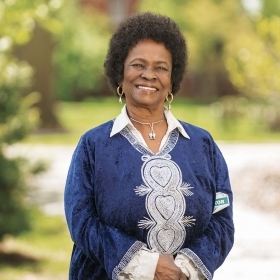On the cover of Brenna Greer’s recent book, Represented: The Black Imagemakers Who Reimagined African American Citizenship, a fashionably dressed young African-American couple relax on a midcentury modern couch in front of a coffee table artfully laden with food, glass bottles of Coca-Cola in their hands. The advertisement, created in the 1950s by Moss Hyles Kendrix, a successful public-relations and advertising executive, is one of many that helped pave the way for the Civil Rights movement, writes Greer, associate professor of history.
In Represented, Greer highlights how three African-American men—Kendrix, John Johnson, publisher of Ebony and Jet magazines, and Gordon Parks, a photographer for Life—helped bring positive images of African-Americans into the mainstream, while making a profit.
Originally, as a graduate student, Greer was interested in black women’s activism, in particular how Rosa Parks created an image of herself as a “mild mannered, accidental activist,” when in fact she was well-known in Montgomery, Ala., for her commitment to racial progress and justice. As Greer looked for other positive images of African-Americans, she discovered that they largely were created by black entrepreneurs. “I kept trying to sidestep that, because I wasn’t a historian of capitalism. I was really interested in the activist sense. But then, throughout the project, that’s where it led me, and so then, eventually, you have to accept where the research is going,” she says.
Greer’s book begins during the New Deal, when Gordon Parks began his career as a staff photographer for the Farm Securities Administration, recording the lives of African-Americans, and Kendrix worked for the government as a public-relations officer. Later, during World War II, they both continued working for the government, putting forth positive images of American democracy that were, Greer says, often counter to their lived experiences as black men. However, she says, these photographs and propaganda “wrote [African-Americans] into this wartime image of American patriotism. … [They] were creating these images of African-Americans … that created definitions of black citizenship that, I would argue, facilitated acceptance of their citizenship.”
After World War II, these men put their skills to use in the booming consumer culture. “African-American consumers were part of that postwar middle-class American Dream drive, even though much fewer of them could achieve it,” Greer says. “Many of them were aspiring to it, and they were defining democracy, freedom, Americanness, success, in those materialistic terms, in addition to the right to vote, the right to marry, the right to education. These consumer aspirations became part of those definitions of what it meant to have first-class citizenship in the United States.”
Johnson Publishing made headlines this past July when, as part of bankruptcy proceedings, it sold off its image archive to four foundations for $30 million. The photos in the collection are enormously significant, says Greer, and at the time they were published in Johnson’s magazines, reinforced the idea that African-Americans were truly American had a claim to complete citizenship.
Greer dedicated her book to her students. “That is where the book came from, was working with them,” she says. Her course U.S. Consumer Culture and Citizenship draws on the same themes she tackled in her book. When she started teaching at the College in 2011, one of the challenges was that “I had not anticipated the degree to which my students took capitalism as a given, as a universal, natural thing. … I’m constantly stressing in the first portion of that class, particularly when we’re in the 19th century … the idea that capitalism was going to be the American way, that was not a given at this point in time. This was still a trial period.” But by the end of the course, when they start discussing capitalism in the online era, students drive the conversation. “Perhaps I’m providing the questions, but they have a much better grasp of the technologies out there, in a sense, and how we are as consumers and what it means to consume what we’re consuming,” she says.








We ask that those who engage in Wellesley magazine's online community act with honesty, integrity, and respect. (Remember the honor code, alums?) We reserve the right to remove comments by impersonators or comments that are not civil and relevant to the subject at hand. By posting here, you are permitting Wellesley magazine to edit and republish your comment in all media. Please remember that all posts are public.